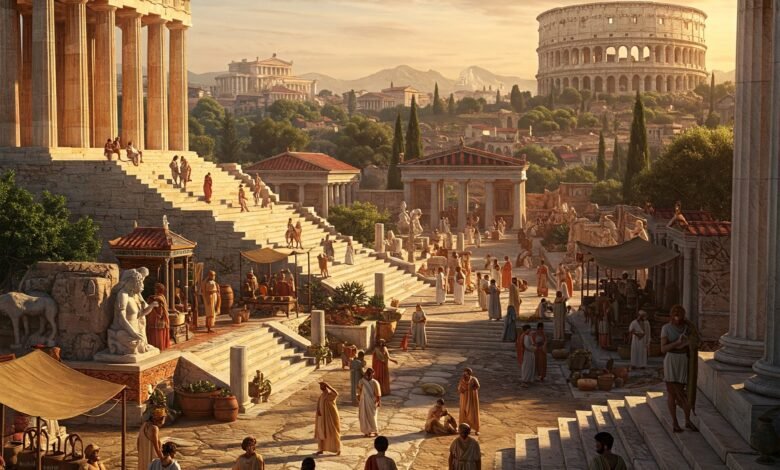
Introduction to Ancient Civilizations
The ancient civilizations of Greece and Rome stand as monumental pillars of human history, influencing the framework of modern society in diverse ways. Geographically, ancient Greece is situated on the southern tip of the Balkan Peninsula, characterized by its mountainous terrain and numerous islands, such as Crete and the Cyclades. This landscape contributed to the development of independent city-states, such as Athens and Sparta, each with their own governance, culture, and traditions. Conversely, ancient Rome emerged along the Tiber River in central Italy and eventually expanded into a vast empire that encompassed territories across Europe, North Africa, and parts of Asia. Its geographical advantages, including fertile lands and access to trade routes, facilitated rapid growth and cultural exchange.
Historically, ancient Greece thrived from around the 8th century BCE to the end of the Hellenistic period in the 2nd century BCE. The classical era of Greece saw unprecedented advancements in philosophy, art, literature, and democracy, laying the groundwork for Western thought and governance. Figures such as Socrates, Plato, and Aristotle catalyzed intellectual discourse, while magnificent structures like the Parthenon epitomized their architectural prowess. Following the Greek influence, ancient Rome began as a small republic in the 6th century BCE and transitioned into an empire that dominated the Mediterranean world until the fall of the Western Roman Empire in the 5th century CE.
The cultural context of these civilizations is essential for understanding their significance. Both ancient Greece and Rome made substantial contributions to various fields, including law, governance, and the arts. Their interrelations also reflect a continuum of influence, as the Romans adopted and adapted many aspects of Greek culture. This synthesis not only shaped their own civilization but also provided a legacy that continues to resonate in contemporary society. As we delve deeper into the complexities of these ancient civilizations, we will explore their achievements, ideologies, and the lasting impact they have left on the world.
The Rise of Ancient Greece
The emergence of ancient Greece is often characterized by the formation of distinct city-states, known as poleis, each with its unique political and social structures. Among the most prominent of these were Athens and Sparta, cities that not only defined Greek civilization but also laid the foundational principles of democracy and military prowess that continue to influence modern societies. Athens, celebrated for its intellectual achievements, emerged as a center of philosophy, art, and democratic governance. The philosophical contributions of figures such as Socrates, Plato, and Aristotle not only shaped the cultural landscape of ancient Greece but also established a legacy that would endure for centuries, influencing Western thought.
In contrast, Sparta was renowned for its formidable military culture and communal living, where citizens underwent rigorous training from a young age. This duality of civic life showcased the diversity within ancient Greece, illustrating how geography played a crucial role in shaping the character of each city-state. The mountainous terrain and proximity to the sea fostered different modes of life; for example, the navy of Athens flourished due to its advantages in maritime trade, while the land-based military strength of Sparta provided security and stability within the Peloponnesian region.
Moreover, the political frameworks established within these city-states—including Athenian democracy, where citizens participated directly in governmental decisions, and the oligarchic structure of Sparta—were both revolutionary for their time. These systems not only influenced governance practices around the Mediterranean but also contributed to a broader discourse on citizenship, rights, and societal responsibilities that resonates to this day. The cultural achievements of ancient Greece, from architectural marvels like the Parthenon to advancements in theatre, further exemplified the civilization’s unique contributions to human history. As we explore the rise of ancient Greece, it is evident that its legacy continues to shape our understanding of governance, philosophy, and art in contemporary society.
The Golden Age of Athens
The 5th century BCE marked a period of remarkable cultural and political development in Athens, often referred to as the Golden Age. This era was characterized by significant advancements in various fields, including arts, theater, and philosophy, which collectively laid the foundation for Western civilization. Athenian democracy flourished during this time, highlighted by the leadership of notable figures such as Pericles, who played an instrumental role in fostering a political environment that encouraged public discourse and civic participation.
Under Pericles’ administration, Athens saw the construction of iconic structures, including the Parthenon, symbolizing the city-state’s power and artistic excellence. This architectural marvel not only showcased advanced engineering techniques but also functioned as a testament to the cultural identity of Athens. Theater emerged as a vital part of Athenian society, with playwrights like Aeschylus, Sophocles, and Euripides producing works that are still revered today. Their plays explored complex themes including morality, fate, and the human experience, profoundly influencing literature and drama across centuries.
Moreover, the philosophical landscape of Athens flourished with the contributions of figures such as Socrates, Plato, and Aristotle. Socrates challenged conventional wisdom through his Socratic method, prompting critical thinking and dialogue among citizens. Plato’s philosophical works, particularly ‘The Republic,’ outlined ideas on justice and governance, while Aristotle’s teachings on ethics and politics established enduring frameworks that shaped future philosophical discourse. The legacy of these philosophers continues to resonate through contemporary thought. The Golden Age of Athens is thus not only a pivotal period in ancient history but also a defining moment in the evolution of Western philosophy and democratic ideals.
Ancient Rome: From Republic to Empire
The evolution of Ancient Rome from a Republic to a formidable Empire stands as one of history’s most notable transitions. Established in 509 BC, the Roman Republic marked an era characterized by a complex system of governance. The Senate, a powerful political body, held considerable authority. Key decisions were made by elected officials known as consuls, who served terms of one year. However, as the Republic faced various challenges, including internal strife and external threats, this political structure underwent significant changes.
The pivotal figure of Julius Caesar emerged during this tumultuous period. His rise to power in the late Republic was marked by military triumphs and populist reforms that endeared him to the Roman populace. Nonetheless, his accumulation of power raised concerns among senators, culminating in his assassination in 44 BC. The aftermath of this event sparked a power struggle that would ultimately redefine Rome’s political landscape.
The consequences of Caesar’s assassination would lead to the ascension of his adopted heir, Octavian, later known as Augustus. Augustus skillfully navigated the remaining power struggles, eventually establishing himself as the first Roman Emperor in 27 BC. This transition from Republic to Empire marked a significant shift in military and political structure. Augustus implemented reforms that centralized authority and expanded the imperial boundaries through military conquests. The Pax Romana, or Roman Peace, initiated under his rule, facilitated a period of stability and prosperity across the vast territories of the Empire.
The expansion of Roman influence was not merely confined to military conquests; it also included the spread of Roman culture, law, and infrastructure. As Roman dominion extended throughout Europe, North Africa, and parts of the Middle East, the social implications of this transformation were profound. Citizens experienced a blend of cultures and the introduction of Roman citizenship to conquered peoples, fostering a sense of unity across diverse regions.
Cultural Contributions of Ancient Rome
Ancient Rome’s cultural contributions have left an indelible mark on various aspects of modern civilization, particularly in architecture, engineering, law, and language. The grandeur of Roman architecture is exemplified through monumental structures such as the Coliseum and the Pantheon. The Coliseum, in particular, was not only a venue for public spectacles but also a testament to Roman engineering prowess. Its design incorporated advanced techniques, such as the use of arches and vaults, which allowed it to accommodate thousands of spectators while maintaining structural integrity. Such architectural innovations have influenced contemporary buildings worldwide.
Furthermore, the Roman aqueducts stand as another remarkable engineering achievement. These structures were essential for supplying cities with fresh water, enabling urban growth and public health advancements. The sophistication involved in their construction reflects a deep understanding of hydrodynamics and materials, allowing for the development of extensive networks that are still admired today.
In terms of governance and societal organization, Ancient Rome established legal principles that form the foundation of modern law. The Twelve Tables provided early codification of legal rights and responsibilities, showcasing Rome’s commitment to the rule of law. Concepts such as justice, legal representation, and rights of the accused stem from Roman legal traditions, significantly influencing contemporary jurisprudence and governance structures around the world.
Moreover, the integration of Greek culture within Roman society enriched Roman art, philosophy, and language. Latin, the language of Rome, became the root of the Romance languages and contributed to various linguistic developments, thereby influencing communication across Europe and beyond. The Roman adaptation of Greek philosophies and aesthetics illustrates a cultural symbiosis that facilitated the dissemination of knowledge and ideas across ages.
Religion and Mythology: Beliefs of Ancient Greece and Rome
The religious beliefs of Ancient Greece and Rome represent a rich tapestry woven from myths, rituals, and an interplay of human experiences with the divine. In both civilizations, religious practices were deeply entrenched in daily life, serving not only as a means for individuals to seek favor from deities but also as a mechanism for communities to bond. The pantheon of gods in Ancient Greece, with prominent figures such as Zeus, Hera, and Athena, reflects the value placed on human traits and emotions, emphasizing a close relationship between mortals and the divine. Similarly, in Rome, gods like Jupiter, Mars, and Venus commanded reverence and were integral to social and political life.
Temples dedicated to these deities were indispensable components of ancient society and stood as symbols of power and devotion. The Parthenon in Athens and the Pantheon in Rome highlight the architectural grandeur associated with worship and civic pride. Rituals, which included sacrifices and festivals, were central to appease the gods, ensuring good harvests, victory in war, and overall prosperity. These expressive traditions not only reinforced religious beliefs but also emphasized the moral and ethical codes of each civilization.
As the centuries progressed, the spread of Christianity began to alter the religious landscape of these ancient cultures. The monotheistic doctrine of Christianity gradually transformed the polytheistic systems of Greece and Rome, reshaping societal norms and governance structures. This transition was not immediate, but ultimately, the decline of traditional worship gave way to a new era defined by Christian teachings. The interplay between ancient religious practices and the rise of Christianity highlights a significant evolution in belief systems, laying foundational values that would influence subsequent cultures.
The Interplay Between Greece and Rome
The intricate relationship between Greece and Rome is a profound testament to the transmission and transformation of culture in the ancient world. As Rome ascended to power, it became increasingly influenced by its predecessor, Greece, whose philosophical, artistic, and educational frameworks shaped the burgeoning Roman society. This cultural exchange primarily began after the conquest of the Greek city-states in the 2nd century BCE, leading to a significant Roman engagement with Hellenistic culture.
Greek philosophy, particularly the teachings of Plato and Aristotle, found fertile ground in Roman thought. Prominent Roman figures, such as Cicero and Seneca, not only assimilated these philosophical traditions but also integrated them into their own work, thus fostering a unique blend of Greek and Roman intellectualism. The Romans saw value in the Greek emphasis on rationality and civic duty, aspects which were essential in the governance of an expanding empire. Over time, the Roman adaptation of Greek philosophical concepts contributed to the foundation of Western philosophy and political theory.
Beyond philosophy, Greek artistic styles significantly influenced Roman architecture and sculpture. The iconic columns of ancient Greece, such as the Doric, Ionic, and Corinthian, were incorporated into Roman structures, symbolizing the fusion of these two great civilizations. Furthermore, Romans adopted various forms of Greek art, reinterpreting them in ways that expressed their own values and aspirations. This collaboration between the two cultures also extended to education. Detailed study of rhetoric, grammar, and literature in Roman schools drew heavily on Greek educational models, marking a profound shift in how knowledge was imparted.
Trade, diplomacy, and military interactions played pivotal roles, fostering a dynamic exchange between Greece and Rome. These connections not only facilitated the transfer of goods but also allowed for a sharing of ideas, practices, and customs that enriched both societies. Ultimately, the Romans not only inherited Greek culture but also transformed it, creating a legacy that would influence countless generations to come.
The Decline of the Roman Empire
The decline of the Roman Empire is a multifaceted event influenced by various internal and external factors. Among the most significant reasons for this decline were economic troubles that plagued the empire throughout its later years. Heavy taxation and inflation weakened the economy, leading to a decline in trade and agricultural production. As resources became scarce, Roman citizens faced hardships, exacerbating social unrest and discontent among the populace.
In conjunction with economic challenges, military losses played a pivotal role in the empire’s decline. Rome’s once-formidable legions began to suffer significant defeats, particularly against the waves of invasions by various barbarian tribes such as the Visigoths, Vandals, and Huns. These military losses not only strained the resources of the empire but also contributed to the erosion of public confidence in the Roman military’s effectiveness. The inability to protect its borders marked a critical point in the empire’s weakening grip on its territories.
Additionally, internal strife further destabilized the Roman Empire. Political corruption, ineffective leadership, and civil wars led to a power struggle that weakened central authority. The empire’s division into Eastern and Western Roman Empires in the late 3rd century CE by Emperor Diocletian was an attempt to manage its vast territories. However, this division ultimately resulted in divergent paths, with the Western Empire succumbing to pressure from invading forces, culminating in the symbolic fall of Rome in 476 CE. This event not only signified the end of the Roman Empire in the West but also marked the onset of the Dark Ages in Europe, a period characterized by a decline in cultural and economic activity. Understanding these factors provides essential insight into one of history’s most significant transitions, shaping the course of European civilization for centuries to come.
Legacy of Ancient Greece and Rome
The influence of ancient Greece and Rome on modern society is profound and far-reaching, as these civilizations laid the foundations for numerous aspects of contemporary life. One of the most significant contributions is to the realm of governance. The concepts of democracy, citizenship, and republicanism find their roots in ancient Greece, particularly in the city-state of Athens. The principles established during that era, such as political participation and public accountability, continue to resonate in today’s democratic institutions around the world. Similarly, Rome’s innovations in structuring governments, including the idea of a senate and checks and balances, have been instrumental in shaping modern political frameworks.
In addition to governance, the arts have also been deeply impacted by the legacies of these two influential civilizations. Greek art and architecture emphasized beauty, proportion, and symmetry, principles that still guide modern artists and architects. The iconic columns, such as Doric, Ionic, and Corinthian, remain staples in contemporary designs, while classical sculptures continue to inspire artistic expression. Similarly, Roman contributions to engineering and architecture, including the development of concrete and the arch, have allowed modern structures to thrive, reinforcing the aesthetic and practical lessons learned from ancient builders.
The literary traditions established by the ancients also persist today. Works of philosophers like Plato and Aristotle laid the groundwork for Western philosophical thought, encouraging critical inquiry and discussion that are vital in modern education. Moreover, epic narratives and dramatic forms, showcased by Homer and Sophocles, continue to shape literature and theater, influencing writers and playwrights through the ages.
Ultimately, the legacy of ancient Greece and Rome is evident in myriad facets of contemporary culture, from governance and art to philosophy and literature. The ideals and innovations from these civilizations remain relevant, encouraging modern society to reflect upon and appreciate the enduring impact of their remarkable journeys through history.






















